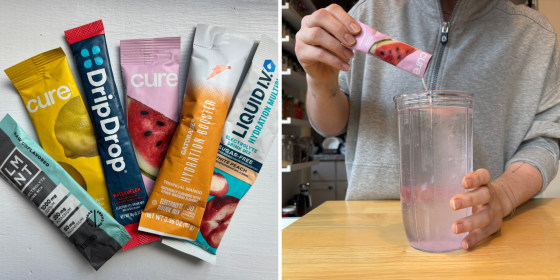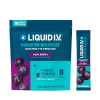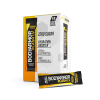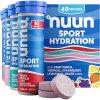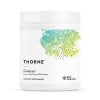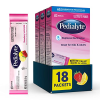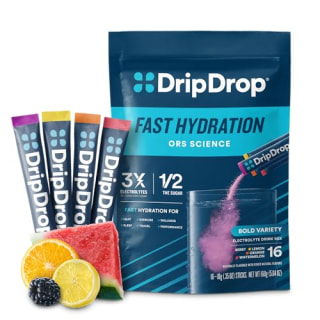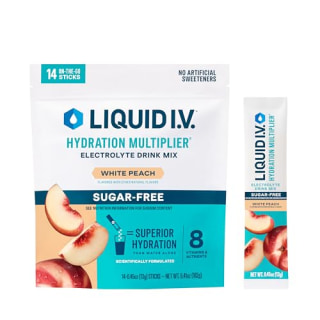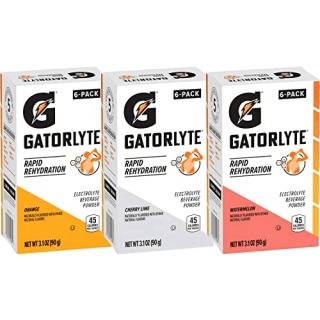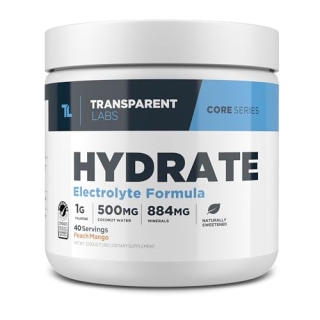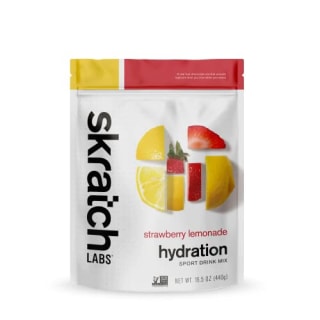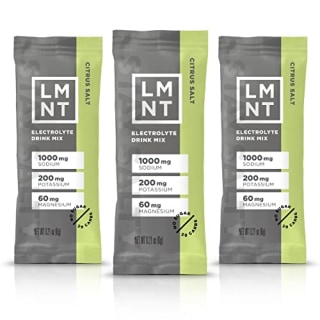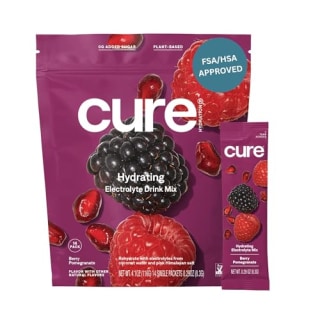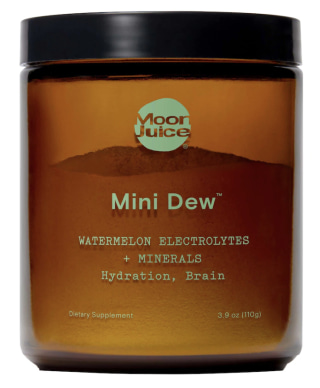Drinking plenty of water is essential to staying hydrated, but for some people, H20 alone doesn’t cut it, says Dr. Matthew Sedgley, a physician specializing in sports medicine at MedStar Health. Those who do strenuous exercise, have a labor-intensive job or spend long periods in the heat may also need to replenish their electrolytes. “Electrolyte is a fancy word for minerals like sodium, potassium and magnesium, and they’re substances our bodies need to function,” he says. “Your body uses them as you do physical activity, which makes replacing them important.”
A fast and convenient way to do that is mixing electrolyte powder into your water, says Amy Goldsmith, a registered dietitian specializing in sports nutrition who owns Kindred Nutrition & Kinetics. These powders often come in pre-measured packets, so you know exactly how much of each mineral you’re getting, and they’re available in various flavors, so they taste good.
I talked to doctors and nutritionists about how to shop for electrolyte powders, as well as who should — and shouldn’t — use them. But remember: Before you take anything, be sure to consult your doctor.
SKIP AHEAD Electrolyte powders 101 | The best electrolyte powders of 2025 | How much electrolytes should you drink? | Signs of electrolyte imbalance | Can electrolytes powder help with a hangover? | Why trust NBC Select
Electrolyte powder 101
Before buying electrolyte powder, it’s helpful to understand what it is, the benefits it offers and who it’s designed for. Here’s some key information experts want you to know.
How I picked the best electrolyte powders
While shopping for electrolyte powders, experts recommend keeping the following in mind:
- Mineral composition: An electrolyte powder’s nutrition label details what minerals it’s made with. The most important minerals to look for are sodium and potassium — while sweating, you lose them at the highest rates, says Jones. Some powders also contain electrolytes like calcium, magnesium, chloride and phosphorus, but they’re not as quickly depleted, so they’re less important from a hydration standpoint, she says.
- Mineral concentration: The nutrition label also tells you how much of each mineral the powder is made with, measured in milligrams. Formulas vary by brand. Overall, the right amount of each mineral for you depends on factors like your level of physical activity, sweat rate and health status, so talk to your doctor about what they recommend. As a baseline, our experts break down their suggestions below.
- Sugar content: Many electrolyte powders contain sugar because it’s a carbohydrate that acts as fuel for your muscles and aids in fluid balance, says Goldsmith. Sugar is beneficial for the average healthy person engaging in strenuous physical activity for 90 minutes or longer, like marathon runners, says Sedgley. If that doesn’t sound like you, you can opt for a sugar-free electrolyte powder, if you prefer, says Reavis. Check the electrolyte powder’s nutrition label for information about the source and concentration of sugar, measured in grams. If you’re sensitive to sugar, consult your doctor about what’s best for your body. (Read more about sugar in electrolyte powers below.)
- Additional ingredients: Beyond electrolytes and sugar, some powders have other ingredients, like vitamin C and vitamin B. Read the nutrition label to make sure the powder doesn’t contain ingredients you need to avoid, whether that’s due to a health condition or because you’re getting plenty of it from another source, like a daily multivitamin, says Dr. Sandeep Mallipattu, chief of the division of nephrology and hypertension at Stony Brook Medicine. Also make sure you don’t buy a powder made with caffeine. “Caffeine is a diuretic, which causes our body to lose water, and that’s the opposite of our goal with hydration,” says Reavis.
- Flavor: Electrolyte powders come in various flavors, some of which are more pronounced than others once you mix them with water. Try to avoid artificial coloring and flavoring agents if possible, says Jones. Also, remember that the more sodium in an electrolyte powder, the saltier it will taste, says Goldsmith.
- Third-party certifications: The FDA doesn’t regulate dietary supplements like electrolyte powders prior to them being sold. The agency is only responsible for regulating them after they’ve entered the market. However, companies can opt to have their products tested by agencies like the U.S. Pharmacopeia, Consumerlab.com and NSF International, says Patruno. These organizations give products their seal of approval, which is often reflected on packaging, so long as they meet potency, purity and quality requirements; contain the ingredients listed on their label in the stated amounts; and are free from contaminants. Elite athletes are often drug tested before competitions, so they must buy an electrolyte powder that’s NSF Certified for Sport or has the Informed Sport certification to ensure it’s free of banned substances, says Jones.
The best electrolyte powders of 2025
Below, I rounded up electrolyte powders I’ve tried or experts recommend. I included the amount of sodium and potassium each one has per serving since they’re the most important minerals to look for while shopping, experts say.
It’s important to note that when you add a powder to water, you’ll need to give it a good stir — if you don’t, the powder won’t fully dissolve into your water, and you may end up sipping salty clumps. I recommend using a shaker bottle or investing in a handheld electric mixer to thoroughly incorporate the powder into water.
Best flavor selection: Liquid IV Hydration Multiplier Electrolyte Drink Mix
Liquid IV, which Goldsmith recommends, is one of the most well-known brands in the electrolyte powder space. It comes in over a dozen flavors like lemon lime, strawberry, concord grape and passion fruit, so you’ll likely find one you like. Each pack has 11 grams of sugar, which I find gives it a very sweet taste, so I tend to dilute it with a few more ounces of water than the brand recommends. Liquid IV’s sodium- and potassium-based electrolyte powder is vegan, dairy-free and gluten-free.
Sodium: 560 mg. | Potassium: 370 mg. | Sweetener: cane sugar, stevia leaf extract, dextrose | Form: single-serve packets
Best for beginners: DripDrop Fast Hydration Electrolyte Drink Mix
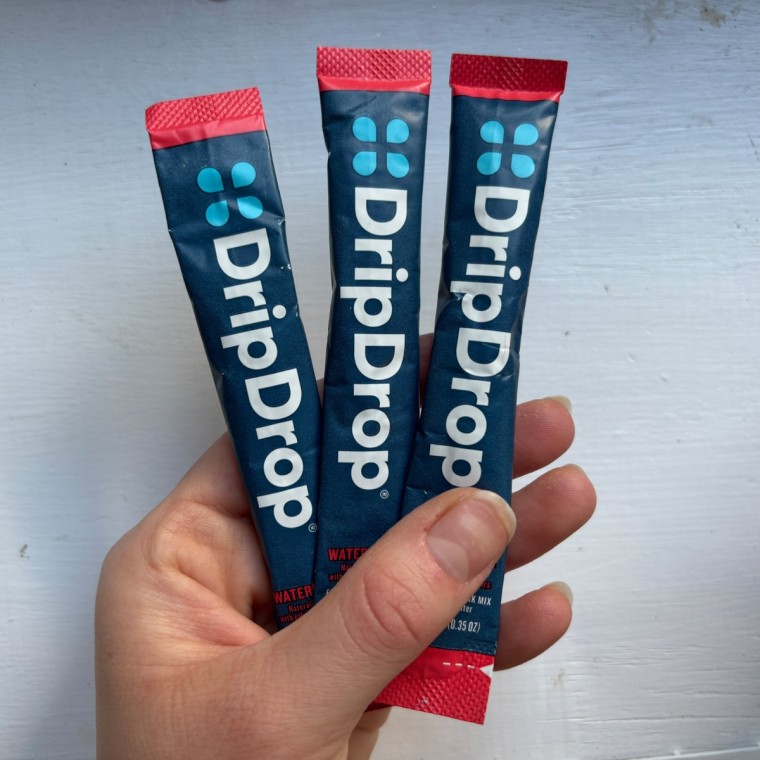
DripDrop’s variety of flavors is similar to Liquid IV’s, but the formula has lower sodium and sugar concentrations. That gives it a less pronounced taste, so I find it ideal for those who've never tried an electrolyte powder before and are getting used to drinking it. The powder is made with sodium, potassium and magnesium, and its formula is gluten-free and vegan. You can buy flavors like fruit punch, orange, lemon-lime and berry.
Sodium: 330 mg. | Potassium: 180 mg. | Sweetener: sugar, fructose, sucralose | Form: single-serve packets
Best artificial sugar-free powder: Liquid IV Sugar-Free Hydration Multiplier Electrolyte Drink Mix
Because I find Liquid IV’s standard electrolyte powder very sweet, I prefer the brand’s sugar-free sodium- and potassium-based formula.
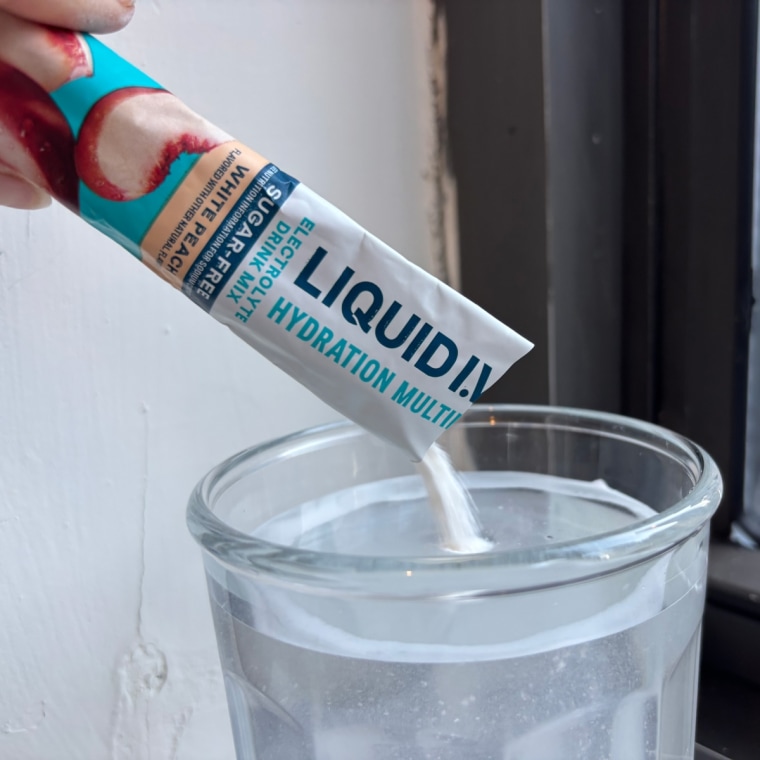
Instead of cane sugar or artificial sweeteners, it’s made with allulose, a natural sugar found in fruit like figs and raisins. My favorite flavors are lemon-lime and white peach, which taste especially refreshing in ice water. Liquid IV’s sugar-free, vegan, dairy-free and gluten-free electrolyte powder also comes in raspberry melon, green grape and rainbow sherbet flavors.
Sodium: 510 mg. | Potassium: 380 mg. | Sweetener: allulose, stevia leaf extract | Form: single-serve packets
Best sports drink alternative: Gatorade Gatorlyte Rapid Rehydration Electrolyte Beverage Powder
Gatorade’s electrolyte powder, which many experts recommend, has an ingredient profile that’s similar to its Gatorlyte sports drink.
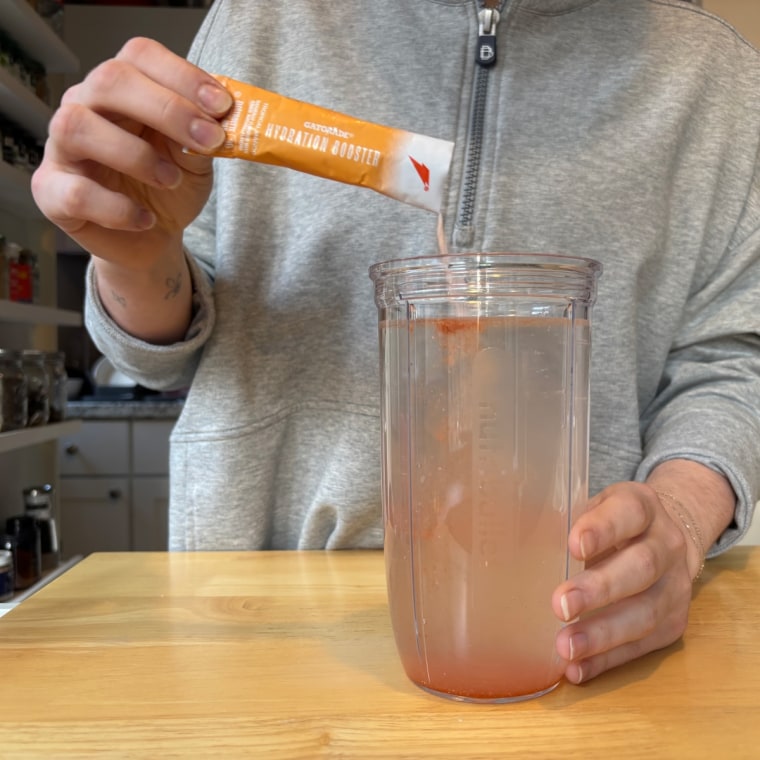
The powder is a great option if you like the taste of Gatorade but want the convenience of a single-serve packet you can throw in your gym bag. You can buy the powder, made with sodium, potassium, calcium, magnesium and chloride, in flavors like cherry lime, orange and watermelon.
Sodium: 490 mg. | Potassium: 350 mg. | Sweetener: sugar, maltodextrin, stevia leaf extract | Form: single-serve packets
Best tasting powder: Body Armor Flash IV Electrolyte Packets
Goldsmith recommends Body Armor’s electrolyte powders over the brand’s pre-mixed beverages for hydration because they have less sugar and more sodium: One packet of the powder has 510 milligrams of sodium and zero grams of sugar, while one pre-mixed beverage has 30 milligrams of sodium and 29 grams of sugar. I’m also a big fan of this electrolyte powder, which the brand sent me to try. Its flavor isn’t overpowering or too sweet, and beyond sodium and potassium, it’s made with chloride, calcium and magnesium. I love the tropical punch flavor, and it’s available in options like lemon-lime, grape, strawberry kiwi and cucumber lime, too.
Sodium: 510 mg. | Potassium: 700 mg. | Sweetener: stevia leaf extract | Form: single-serve packets
Best balanced formula: Transparent Labs Hydrate Electrolyte Powder
This electrolyte powder’s formula has a 2:1 ratio of sodium to potassium, which Goldsmith aims for when choosing a well-balanced product for her clients. It’s also third-party tested and Informed Choice Certified for purity and safety. The powder is made with calcium and magnesium and is free from artificial sweeteners, artificial coloring, dyes and gluten. You can buy flavors like peach mango and tropical punch.
In addition to single-serve packets, Transparent Labs’ Hydrate electrolyte powder comes in a jar with a scooper. Make sure you level off the scoop before mixing with water, says Reavis. If you don’t, the electrolyte concentration may be slightly greater than what’s listed on the product’s nutrition label.
Sodium: 500 mg. | Potassium: 250 mg. | Sweetener: stevia extract | Form: scoopable powder, single-serve packets
Best tablets: Nuun Sport Electrolyte Drink Tablets
“Some brands offer electrolyte tablets rather than powders, which tend to be less messy,” says Jones. “The tabs dissolve in water and usually come in a small tube that’s easy to keep on hand while you’re on the go.” In my experience, electrolyte tablets take a bit longer than powders because you can’t mix them — you have to wait until the tablet completely dissolves on its own before drinking.
I’ve used Nuun’s electrolyte tablets for over five years. They make your water fizzy when they dissolve, which I find is more enjoyable to drink. The tablets have sodium, potassium, magnesium, calcium and chloride, plus they’re gluten-free and vegan. You can buy Nuun’s electrolyte tablets in flavors like strawberry lemonade (my favorite), watermelon, citrus fruit and tri–berry. They’re also eligible to buy with a flexible spending account (FSA).
Sodium: 300 mg. | Potassium: 150 mg. | Sweetener: stevia leaf extract, dextrose | Form: tablets
Best for athletes: Thorne Catalyte
If you want a slightly sweet taste and fewer added carbohydrates than a sports drink, “Thorne Catalyte is a great option, and it’s also NSF Certified for Sport,” says Jones. “With 485 milligrams of sodium and five grams of carbohydrate, it’s perfect for active individuals.” Young also recommends this lemon-lime electrolyte powder, made with sodium, potassium, calcium, magnesium and chloride. Thorne Catalyte has no dairy, sugar, gluten or artificial flavors.
Sodium: 485 mg. | Potassium: 96 mg. | Sweetener: tapioca maltodextrin | Form: scoopable powder
Best for moderate exercise and active careers: Skratch Labs Hydration Powder
Since it has a moderate sodium concentration of 400 milligrams, Jones recommends Skratch Labs’ Hydration powder for those who have active careers, like construction workers, nurses, teachers and landscapers, and those who exercise for under an hour but tend to sweat a lot while doing so. The vegan powder is made with sodium, potassium, calcium and magnesium, and it’s gluten- and dairy-free. Skratch Labs’ electrolyte powder comes in flavors like pineapple, strawberry lemonade and orange.
Sodium: 400 mg. | Potassium: 50 mg. | Sweetener: cane sugar, dextrose | Form: scoopable powder
Best for intense exercise: LMNT Electrolyte Drink Mix
“For those with very high sweat rates, I often suggest incorporating LMNT to aid in rehydration and maintaining energy levels during exercise,” says Jones.
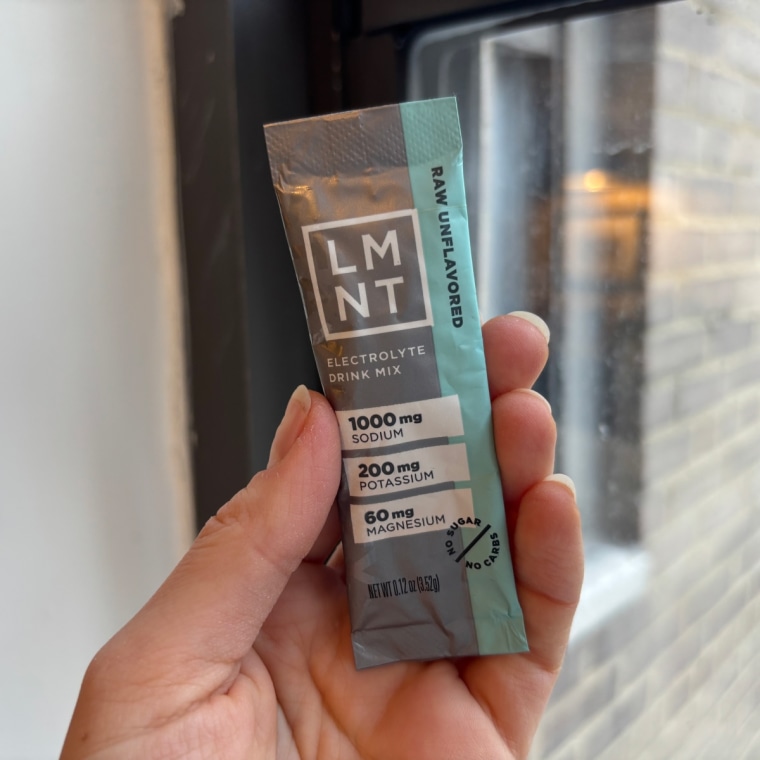
LMNT’s vegan, gluten-free electrolyte powder has the highest sodium concentration out of all the options on this list at 1,000 milligrams, making it suitable for those engaged in prolonged intense physical activity, like marathon runners and long-distance bikers. Its formula has magnesium as well as sodium and potassium. You can buy the powder in flavors like citrus salt, watermelon salt, raspberry salt and mango chili salt.
Sodium: 1,000 mg. | Potassium: 200 mg. | Sweetener: stevia leaf extract | Form: single-serve packets
Best FSA-eligible: Cure Hydration Electrolyte Drink Mix
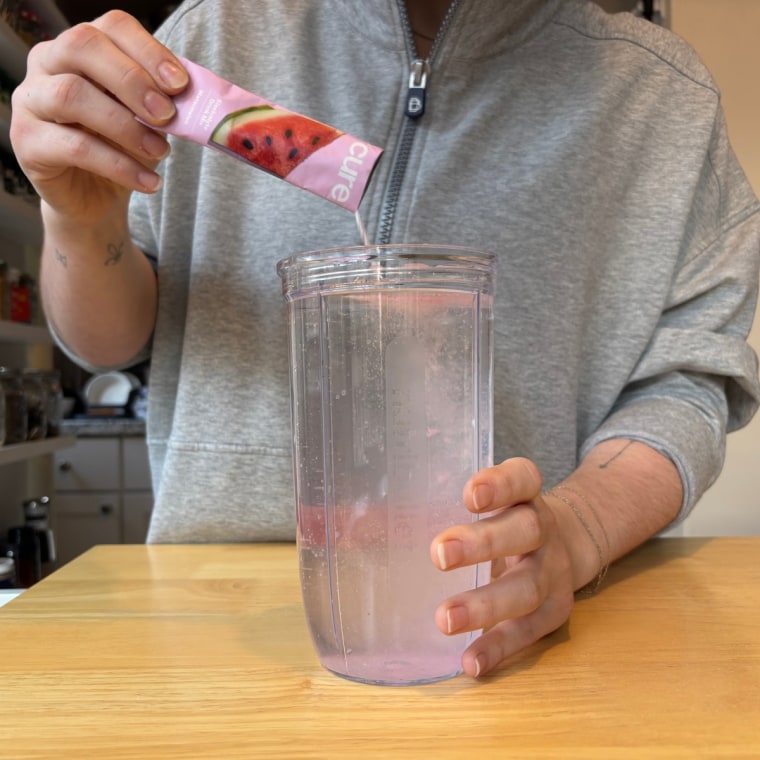
Electrolyte replacement products that help prevent dehydration and don’t contain added supplements are eligible for reimbursement with an FSA, a health savings account (HSA) or a health reimbursement arrangement (HRA). Very few brands currently qualify, but Cure is one of them. Its 240 milligrams of sodium is a low concentration, which makes it a great option for first-timers. Cure sent me flavors like berry pomegranate, watermelon, lemonade and strawberry kiwi to try, all of which tasted great and dissolved quickly when I stirred the powder into water.
Sodium: 240 mg. | Potassium: 300 mg. | Sweetener: stevia extract, monk fruit extract | Form: single-serve packets
Most subtle flavor: Moon Juice Mini Dew Electrolyte Powder
I often crave an intensely flavored beverage during workouts, but I can’t always stomach something super sweet or salty before I exercise.
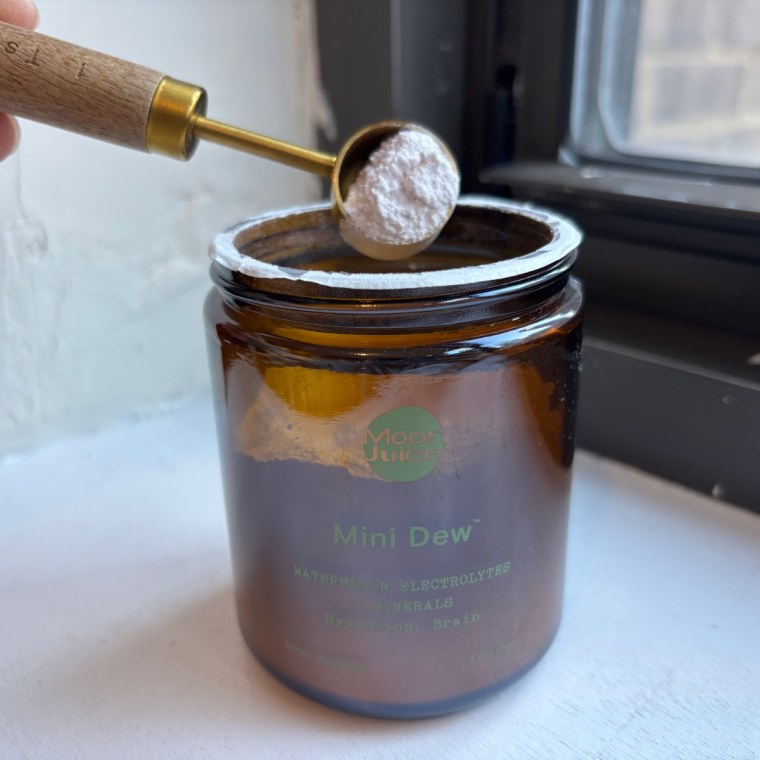
That’s when I use Moon Juice’s electrolyte powder, which the brand sent me to try. It helps me preload electrolytes before a long run or hot yoga class, but I barely taste the powder. Moon Juice’s Mini Dew electrolyte powder is sugar-free and made with sodium, potassium, calcium, magnesium and chloride. Moon Juice also offers a pomelo-flavored version.
Sodium: 270 mg. | Potassium: 130 mg. | Sweetener: stevia leaf extract | Form: scoopable powder
Best for when you’re sick: Pedialyte Electrolyte Powder
You lose electrolytes while you’re sick if you’re vomiting or having diarrhea, says Mallipattu. In those cases, he recommends drinking Pedialyte, available in powders or as a pre-mixed liquid solution. It has a very simple formula mainly composed of sodium, potassium and chloride, which is similar to what you’d get through IV fluids at the hospital, he says. You can get Pedialyte powder in flavors like grape, fruit punch and cherry.
Sodium: 270 mg. | Potassium: 130 mg. | Sweetener: dextrose, sucralose | Form: single-serve packets
What amount of electrolytes should you drink?
The FDA sets Daily Value recommendations for amounts of certain nutrients you should not exceed each day, including electrolytes like sodium, potassium and calcium. However, these recommendations don’t account for how much of each mineral you lose and need to replace while doing physical activity, says Goldsmith. Use the FDA’s Daily Value recommendations as a guide while evaluating electrolyte powders’ nutrition labels, but talk to your doctor about what’s right for you, says Patruno.
Sodium
Sodium is the most important mineral to prioritize when buying an electrolyte powder since you lose it at the highest rate while sweating, says Jones. However, how much sodium you need depends on your activity level, sweat rate and overall health status. Below, experts share their recommendations for sodium concentration in electrolyte powder, but consult your doctor to determine what’s best for you.
- 200 milligrams of sodium: Someone who engages in moderate physical activity for an hour or less, or works a job that requires them to be on their feet all day.
- 500 milligrams of sodium: Someone who engages in moderate to intense physical activity for over an hour, works a labor-intensive job and/or spends an extended period of time outdoors in the heat.
- 1,0000 milligrams of sodium: Someone who engages in prolonged intense physical activity, like marathoner runners, long-distance bikers and those playing team sports.
- Over 1,000 milligrams of sodium: Don’t take an electrolyte powder with over 1,000 milligrams of sodium unless you’re directed to by a medical professional. For example, a nutritionist may recommend one of these highly concentrated powders for elite athletes competing in events like Ironman Triathlons, says Jones.
Potassium
After sodium, pay attention to potassium since it’s the mineral you lose at the second highest rate through sweat, says Jones. Many electrolyte powders have a 2:1 ratio of sodium to potassium, like 500 milligrams of sodium to 250 milligrams of potassium, for example. High sodium intake with insufficient potassium can quickly increase blood pressure, but a balanced 2:1 ratio helps prevent that from happening as the electrolytes move through the cells, says Sedgley.
Other minerals
Some electrolyte powders contain additional minerals like calcium, chloride, magnesium and phosphorus. They’re less important from a hydration standpoint, so don’t worry about them unless your doctor advises you to, says Jones.
Why is there sugar in electrolyte powder?
When you do over an hour of intense exercise like running or biking, your body uses sugar, a carbohydrate, as fuel for your muscles, says Goldsmith. Sugar also helps with fluid balance and masks the salty taste of electrolytes, she says. Because of this, many electrolyte powders have 10 to 20 grams of added sugar per serving. “In terms of athletic performance, we think of sugar in an electrolyte powder differently than added sugar in regular food,” says Goldsmith. “This amount of added sugar per serving could be considered excessive if you’re sedentary and eat a lot of foods with added sugars, but from an exercise perspective, it’s necessary for your muscles.” That said, it’s important to think about your daily sugar intake to properly assess your needs, so consult your doctor.
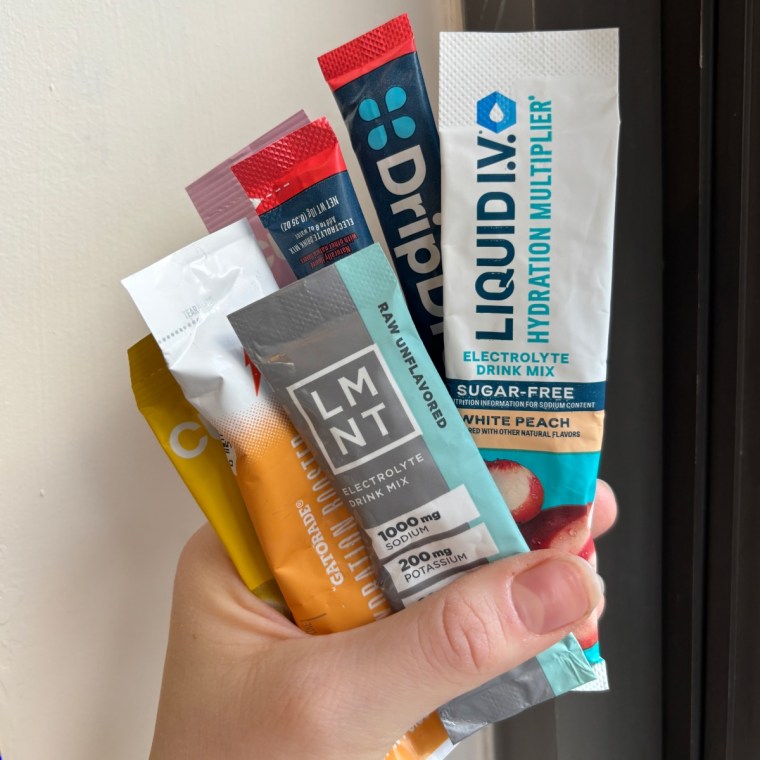
Electrolyte powders are made with different types of sugar, including natural sugars like honey and agave, cane sugar and artificial sweeteners like stevia and xylitol. Each type of sugar has a different flavor and glycemic index, meaning how quickly it raises blood sugar levels after you eat it. The average healthy person doesn’t have to think much about the type of sugar in an electrolyte powder and can prioritize their taste preferences, says Young. But if you have a medical condition like diabetes and need to be careful about sugar consumption, consult your doctor about what’s best for your body. Young also says that artificial sweeteners tend to give some people an upset stomach, so consider avoiding them if you have a history of gastrointestinal issues.
When should you drink electrolyte powder?
There’s no perfect time to drink electrolyte powder. Everyone’s body is different, so figuring out what’s right for you involves some trial and error, as well as consulting your doctor.
- Drinking electrolyte powder about two hours before physical activity ensures your body has an ample supply available, so when you start sweating and losing electrolytes, you don’t get depleted quickly, says Reavis. Preloading electrolytes is especially important if you’re doing physical activity outdoors in the heat for an extended period. High temperatures exacerbate sweating and, therefore, electrolyte loss, which puts you more at risk for quick depletion, says Reavis.
- Drinking electrolyte powder during physical activity helps you constantly replenish your supply so you don’t hit a point where you’re running on empty, says Reavis.
- Drinking electrolyte powder after physical activity can help build your supply back up after you’ve used everything available, says Reavis. However, your body needs electrolytes most when you’re actively sweating, so drinking them after physical activity isn’t typically the most beneficial, he says.
Overall, “hydration is a lot like pain management,” says Goldsmith, “Once you’re behind, it’s really hard to get ahead of it.” That said, ensure you’re drinking enough water daily, regardless of whether you’re adding electrolyte powder at some point.
Who should not use electrolyte powder?
Suppose you don’t engage in much physical activity during your day-to-day life and aren’t heavily sweating. In that case, you can likely get plenty of electrolytes from a healthy, balanced diet, says Reavis, so electrolyte powder is unnecessary. However, some people find that adding a small amount of flavored electrolyte powder to their water — like half a packet or less — encourages them to drink. So, as long as you consult your doctor and choose an electrolyte powder with a low amount of sodium (200 mg to 300 mg.), do what works for you, says Reavis.
Additionally, a few groups of people need to be extra cautious when it comes to using electrolyte powder, making it even more important to work closely with a doctor to find the right option:
- Anybody with a cardiovascular condition. Consuming high sodium levels may lead to fluid retention, which can be dangerous for those with heart conditions that make it hard for the body to get rid of water, says Sedgley.
- Anybody with a kidney condition that makes it hard for the body to get rid of excess electrolytes, says Sedgley. If you’re prone to kidney stones, pay close attention to how much vitamin C is in the powder you’re considering — in excess amounts, it can lead to kidney stone formation, says Mallipattu.
- Children, who should not drink electrolyte powder unless they’re directed to by a doctor since most products are created for adults, says Sedgley.
What is an electrolyte imbalance?
An electrolyte imbalance occurs when there’s either too many or insufficient electrolytes in your body, says Sedgley. Some symptoms of an electrolyte imbalance overlap with those of dehydration, and you can experience both conditions simultaneously — overall, however, they’re different from one another. Dehydration has to do with water loss, while an electrolyte imbalance has to do with being deficient or abundant in certain minerals, says Mallipattu. (If you’re concerned about experiencing dehydration and/or an electrolyte imbalance, consult your doctor.)
An electrolyte imbalance can present differently depending on the minerals your body has too much or too little of, says Mallipattu. If you’re low or high in sodium, for example, you may experience symptoms like confusion or an unstable gait, he says. If you’re low in potassium, you may experience muscle weakness and cramps or, in more severe cases, heart arrhythmias (irregular heartbeat), says Mallipattu.
Hyponatremia, a condition that occurs when there’s not enough sodium in your blood, is one of the main types of electrolyte depletion Sedgley sees during marathons and similar physically demanding events. “If someone stopped at every water station on the course and they’ve drunk too much, plus they’re sweating out salt, they may have diluted the sodium in their blood,” he says, noting that symptoms of hyponatremia include muscle cramps, nausea, headaches, confusion and fatigue.
How does electrolyte powder compare to other electrolyte products?
Beyond electrolyte powder, brands make electrolyte drops, chews, gels and pre-mixed drinks like Gatorade and Powerade. Each product offers its own set of benefits, but for the most part, they’re variations on the same theme, so choosing one is a matter of personal preference. However, keep in mind that electrolyte products can differ in their average mineral concentration, which impacts how much one serving can help boost your hydration levels.
“You can’t get as high of a concentration in one serving of an electrolyte drop or chew as you can get in a powder,” says Goldsmith. “That means you usually have to use more of those other products more often.” Two of SaltStick’s Electrolyte FastChews, for example, have 100 milligrams of sodium total — if you’re running a marathon, you may need to take them every few miles, depending on how much you’re sweating. But one packet of the brand’s DrinkMix Electrolyte Powder has 430 milligrams of sodium — if you had it before your race, you might feel hydrated enough to stick with drinking water during and afterward.
Some people also use different electrolyte products depending on the situation. Chews or gels, for instance, are typically easier for runners to fit in their fanny packs and quickly take during a race. But those who play sports like baseball or soccer can keep a water bottle on the sidelines and mix in powders.
Does electrolyte powder help with a hangover?
Yes, to some degree, drinking electrolyte powder can help with a hangover, says Mallipattu. “You often end up urinating a lot if you drink a lot of alcohol, so you lose water and some sodium,” he says. “Therefore the electrolytes do make a difference, but eating a salty meal may help as well.”
Meet our experts
At NBC Select, we work with experts who have specialized knowledge and authority based on relevant training and/or experience. We also take steps to ensure that all expert advice and recommendations are made independently and with no undisclosed financial conflicts of interest.
- Dr. Matthew Sedgley is a physician who specializes in sports medicine at MedStar Health.
- Dr. Sandeep Mallipattu is chief of the division of nephrology and hypertension at Stony Brook Medicine.
- Kelly Jones is a sports dietitian who works with professional and student athletes (MS, RD, CSSD).
- Amy Goldsmith is a registered dietitian who specializes in sports nutrition and owns Kindred Nutrition & Kinetics (RD, LDN).
- Michael Reavis Jr. is a clinical dietitian at the University of Maryland Medical Center (MS, RD, LDN).
- Jay Patruno is a registered dietitian and certified personal trainer (MS, RDN, LDN, CPT, CNC).
- Lisa Young is a registered nutritionist and an adjunct professor of nutrition at New York University (Ph.D, RDN).
Why trust NBC Select?
I’m a reporter at NBC Select who writes about health and wellness, including articles on KN95 masks, sunburn treatments, at-home Covid tests and ingrown hair treatments. For this article, I interviewed seven doctors and nutritionists about how to shop for the best electrolyte powder. Experts recommended some of their favorite options, and I also included products I’ve tried.
Catch up on NBC Select’s in-depth coverage of personal finance, tech and tools, wellness and more, and follow us on Facebook, Instagram, Twitter and TikTok to stay up to date.
- Electrolyte powder 101
- Frequently asked questions
- How I picked the best electrolyte powders
- The best electrolyte powders of 2025
- What amount of electrolytes should you drink?
- Why is there sugar in electrolyte powder?
- When should you drink electrolyte powder?
- Who should not use electrolyte powder?
- What is an electrolyte imbalance?
- How does electrolyte powder compare to other electrolyte products?
- Does electrolyte powder help with a hangover?
- Meet our experts
- Why trust NBC Select?
